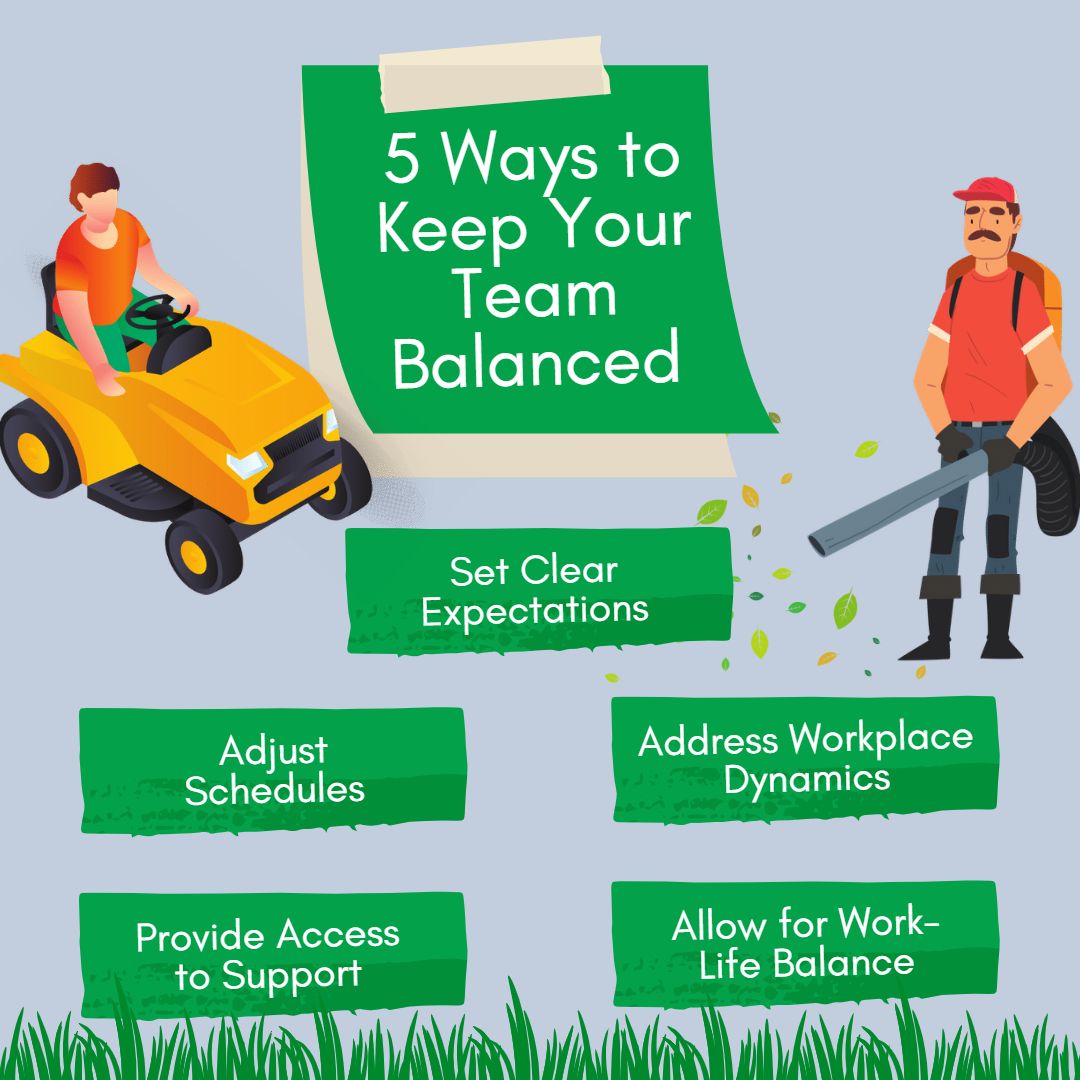
We all want to love our careers, especially if we work in parks and recreation. Being outdoors, using our skills for better parks and facilities, and making a difference in the community can be very rewarding.
But almost every job has some level of stress. How we handle that stress plays a significant role in our work satisfaction.
For a parks maintenance team, the growing season can get extremely busy. Issues could pop up at multiple sites. Equipment breaks. Staff call off.
A chaotic environment takes more energy to stay focused. The work-related stress may take its toll on your team. That stress could lead to burnout.
This article explores burnout, the signs someone is struggling with it, and burnout prevention at work.
What is Burnout?
Burnout is a state of physical and emotional exhaustion from long periods of stress and unresolved issues. The condition often results in decreased productivity and a loss of personal identity.
But only some people under stressful conditions get burnout.
Everyone handles stress differently. A combination of personality traits, work-life balance, coping mechanisms, and existing support networks can all contribute to managing stress.
Signs of Burnout
Those dealing with burnout can feel distressing physical and mental symptoms. Addressing burnout requires personally recognizing the signs and being aware of others struggling with the condition.
Physical symptoms of burnout include:
- Fatigue
- Headaches
- Frequent Illness
- Digestive Issues
- Different Sleeping Patterns
- Changes in Appetite
- Chronic Aches and Pains
- Abusing Substances to Cope
Mental symptoms of burnout include:
- Decreased Motivation
- Low Work Satisfaction
- Trouble Concentrating
- Negative and Cynical Thoughts
- Higher Anxiety
- Depression
- Isolation
Some individuals working in maintenance may feel uncomfortable addressing mental health issues. They may feel they need to power through or “deal with it” until things get better. Unfortunately, this only makes the situation worse for themselves and their team.
Workplace Hazards Related to Burnout
Workplace burnout directly affects everyone in the department. One or more team members struggling with burnout can impact the health and safety of the entire team and the public.
The effects of burnout can include:
Increased Absenteeism/Detachment from Duties
Fatigue, lack of motivation, and poor job satisfaction increase the likelihood of an individual calling off from work. Unfortunately, this can disrupt your scheduling and workflow. Frequently being short-staffed may cause added stress and affect the morale of others in the crew.
Plus, at work, burnout can lead to ambivalence and neglecting duties. Inspections get missed. Small problems turn into larger ones. Soon, it leaves the whole team looking unorganized and unprofessional.
Incidents Driving or Operating Equipment
Burnout affects one’s focus, energy levels, and cognitive function, which are necessary to operate vehicles and equipment safely. A lack of concentration while driving, operating mowers, or equipment like chainsaws can lead to dangerous conditions and serious injuries.
Toxic Work Environment
Negativity is contagious--especially when the work environment is stressful and lacks support. Negative talk and cynical attitudes erode the team’s culture. And eventually, the group becomes dysfunctional or adopts a counterproductive us against them mentality.
Burnout Prevention at Work

Set Clear Expectations
One way to help avoid burnout is to have clear expectations for the team to follow. Expectations includes clear job descriptions, standard operating procedures, and task scheduling. When the team knows their day's what, when, and how, they can be more physically and mentally prepared for what lies ahead.
Scheduling routine tasks in advance, allowing time for surprise maintenance issues, and ensuring your work order system is efficient can all help the team understand what expectations.
Adjust Schedules
If someone is going through a difficult time, consider finding ways to switch up their task schedule so the work is more manageable or allow for more flexible hours. It’s not always possible, but giving someone a little bit lighter duty as they manage their burnout could lead to a quicker recovery and better morale.
Provide Access to Support
Some maintenance professionals aren’t very comfortable talking about their feelings, especially to their peers.
But there are other ways we can support struggling team members that don’t feel like an intervention. Support can include:
- Having a quick, informal check-in to discuss any issues they’ve noticed
- Providing information about any available employees assistance programs
- Finding a mentor for the struggling individual
- Hold in-services on relevant topics like time management, proper procedures, and self-care.
Address Workplace Dynamics
As much as we hope personnel issues will work out, it’s not always the case. Sometimes you may have to have hard conversations with those you supervise. Other times you may have to reassign teams or, unfortunately, let someone go.
Ignoring workplace issues and hoping they will get resolved or go away, could be doing much more harm than good.
Allow for Work-Life Balance
Some individuals don’t know how to set clear boundaries regarding a work-life balance. Sometimes it has to do with personality. Other times it may be external factors like needing extra money, no positive leisure outlets, or having difficulty saying no.
You can’t make someone stop thinking about work. You could, however, reduce their exposure to it when they are not on the clock. For example, do you have to text them a question when it is their weekend off? Can an email memo be sent when most or all of your team is on the clock? Can you address an issue in person?
By recognizing burnout, creating a supportive, communicative work environment, and allowing the team to find more balance in life, you set the stage for a more productive, resilient team.
